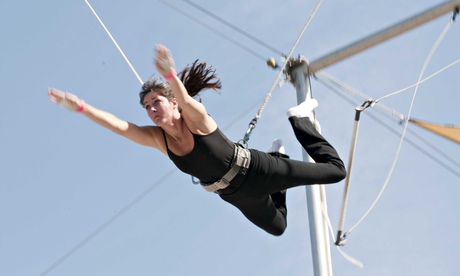
Under the glare of lights in a south London sports hall a group of women coat their hands expectantly with rosin – an unusual fitness class is about to start. The women, who all suffer from depression, are learning trapeze skillls with the aim of building their confidence and strength, and moving them towards employment.
The women watch as Amanda Miles, owner and teacher at My Aerial Home, goes through the basics. She grips a bar with both hands, demonstrating a safe way to hang. Lifting herself, she swings her legs and pointed feet up to hook on to the bar. In one swift move, she is gracefully perched high on the trapeze with perfect posture. A sense of unease grows, but the women are encouraged to at least give it a try.
It's one of the participants, Jo Rixom, who took the idea of engaging women with depression through trapeze classes to her employer, Status Employment, a charity helping people with mental health problems return to work. The project got funding for people referred by both GPs and community mental health teams, which Rixom says was controversial but important: "People can't be separated into mental health silos. If you're boosting confidence through exercise, that helps with therapy and employment support, which you get separately. If you're feeling physically stronger, you feel mentally stronger. If you can't overcome barriers and fear in a therapy session and you do it in a trapeze class, it works together."
Looking after three young children as a single parent, alongside finishing her stressful teacher training, took its toll on Catherine Eaglestone, who attends the class. She crashed into a deep depression, struggled with leaving her home and saw her anxiety levels rocket. She had been going to cognitive behavioural therapy (CBT) for a year when she was offered trapeze. At first, even getting to the class was difficult. But despite feeling tearful and overwhelmed, she realised that: "Trapeze is symbolic of things out of reach and you find your way to get up. You're moving up and there's a bar, you can get on it and then you're able to reach above it."
Her mood lifted with continued improvements: "To turn your body upside-down was extraordinary, as an adult shifting your whole perspective physically moved things."
Many attendees struggle at first to lift their body weight, and swing around in a fluid movement to propel up and on to the bar. It takes time to build the muscle and upper body strength to haul yourself up, and hands get sore and tender from gripping the bar. But according to Rixom and Miles, the sessions offer a space where depression and tears are accepted and where women can talk to others who feel the same.
Amanda says that these classes offer a gentle introduction where people learn at their own pace, building self-belief and focus. She sees benefits: "You might be going through a tough time, then you come to trapeze, it's overwhelming and you're thinking I've got to hold on, I don't want to fall off! People make friends and rest their brain from daily worries and then you see: they're a little baby bird who's learnt to fly and off they go."
Growing physically stronger, Eaglestone felt some of the depression lifting, allowing her to see possibilities. Volunteering for Cub and Scout groups that her children were part of was the first step. From this, she founded an kids theatre workshop which developed into her own salaried company. Status Employment then hired Eaglestone to work a paid project linking trapeze and drama, to increase confidence in people with mental health problems and to get them socialising.
Remembering one group, Miles and Rixom tell me that they developed a community, spurring each other on to perform individual routines in a show: "Nobody crumbled, nobody fell apart; they blossomed even when we didn't expect it. When you've put yourself on the spot and deliver, you've got to be able to do something like walk into an interview," says Rixom.
The pre- and post- class assessments that Rixom collects show reduced levels of anxiety and depression after classes and increased confidence and self-esteem. The group feedback emphasises achievement from overcoming fear and that people are subsequently more active, with more energy. One attendee transferred the ability to overcome fear in trapeze to fear about networking and found a job through making professional contacts. While Rixom realises trapeze doesn't work for everyone – the physical demands and slow improvements can even make some people feel worse, and there's the odd dropout – for many it can make a huge difference.

